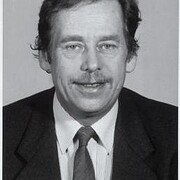Václav Havel (1936–2011)
Author of Disturbing the Peace: A Conversation with Karel Huizdala
About the Author
Václav Harvel (October 5, 1936 - December 18, 2011) was a Czech playwright, essayist, poet, philosopher and politician. He was the ninth and last president of Czechoslovakia (1989-1992) and the first president of the Czech Republic (1993-2003). He wrote more than 20 plays and numerous non-fiction show more works, translated internationally. At the time of his death he was Chairman of the New York-based Human Rights Foundation. Havel received many recognitions, including the United States Presidential Medal of Freedom, the Gandhi Peace Prize, the Philadelphia Liberty Medal, the Order of Canada, the freedom medal of the Four Freedoms Award, the Ambassador of Conscience Award and the Hanno R. Ellenbogen Citizenship Award. Havel died in his home in 2011. He was the author of many poetry collections and plays including, The Garden Party, The Beggar's Opera, Mountain Hotel and The Pig. (Bowker Author Biography) show less
Image credit: Image © ÖNB/Wien
Series
Works by Václav Havel
Living in Truth: 22 Essays Published on the Occasion of the Award of the Erasmus Prize to Vaclav Havel (1987) 229 copies
Vanek-Trilogie Audienz - Vernissage - Protest und Versuchung - Sanierung: Audienz - Vernissage - Protest und… (1989) 26 copies
O lidskou identitu : , fejetony, protesty, polemiky, prohln rozhovory z let 1969-1979 (1989) 10 copies
Projevy, leden-cerven 1990 (Dokumenty demokraticke revoluce) (Czech Edition) (1990) 7 copies, 1 review
Die Gauneroper. Das Berghotel. Erschwerte Möglichkeit der Konzentration. Der Fehler: Theaterstücke (1990) 6 copies
Protest 6 copies
Friedenspreis des Deutschen Buchhandels: Ansprachen aus Anlaß der Verleihung des Friedenspreises des Deutschen… (1989) 5 copies
Teade 5 copies
Şeytan Çelmesi 2 copies
Unveiling 2 copies
Largo desolato ; Pokoušení ; Asanace 2 copies
The view from Prague : the expectations of world leaders at the dawn of the 21st century (2007) 2 copies
The anatomy of a reticence : eastern European dissidents and the peace movement in the West (1985) 2 copies
LARGO DESOLATO BURUK EZGİ 2 copies
Hostina 1 copy
mumo opening 1 copy
Ut med språket 1 copy
G�r��me Kutlama �a�r� 1 copy
Területrendezés, Kisértés 1 copy
Catastrophe 1 copy
The Hotel 1 copy
Despre identitatea umana 1 copy
Mistake 1 copy
Associated Works
Teaching with Fire: Poetry That Sustains the Courage to Teach (2003) — Contributor — 204 copies, 1 review
We Are Children Just the Same: Vedem, the Secret Magazine by the Boys of Terezin (1995) — Foreword, some editions — 66 copies, 1 review
Tagged
Common Knowledge
- Canonical name
- Havel, Václav
- Legal name
- Havel, Václav
- Birthdate
- 1936-10-05
- Date of death
- 2011-12-18
- Gender
- male
- Nationality
- Czech Republic
- Country (for map)
- Tchécoslovaquie
- Birthplace
- Prague, Czechoslovakia
- Place of death
- Hrádeček, Czech Republic
- Places of residence
- Prague, Czech Republic
- Education
- Czech Technical University in Prague
- Occupations
- playwright
Essayist
politician
President of Czechoslovakia (1989-1992)
President of Czech Republic (1992-2003) - Organizations
- Government of Czechoslovakia
Government of Czech Republic - Awards and honors
- Gandhi Peace Prize (2003)
Austrian State Prize for European Literature (1968)
Royal Society of Literature (Honorary Fellow)
Presidential Medal of Freedom (2003)
Franz Kafka Prize (2010)
Order of Canada ( [2003]) (show all 8)
American Academy of Arts and Letters ( [1991])
Olof Palme Prize (1989)
Members
Reviews
Lists
Awards
You May Also Like
Associated Authors
Statistics
- Works
- 116
- Also by
- 12
- Members
- 3,080
- Popularity
- #8,287
- Rating
- 4.0
- Reviews
- 31
- ISBNs
- 261
- Languages
- 22
- Favorited
- 14




















I read the essay in one sitting, so I confess every lesson did not sink in. However, while reading the book on my Kindle, I visited Amazon's website and bought the print edition. This book offers invaluable lessons, so I got a paperback copy as a reference for my future writing.
Vaclav Havel's writing style is direct, assertive, spare, and accessible to everyone, unlike academic writing, which uses one hundred convoluted words where one will suffice.
He started the book by comparing traditional dictatorship, which relies on force, to modern totalitarianism, relying on force, persuasion, and 'thought control.' Even though he did not reference George Orwell's book, '1984,' you will discern shades of the dystopian novel's lessons in this excellent essay.
Timothy Snyder's excellent introduction is a helpful bonus and sets the stage for Vaclav Havel to take over and speak in his voice. I recommend reading the introduction (many people avoid reading the introduction) because Timothy highlights a few critical spots in the book. For instance, when Vaclav Havel writes about consumerism, the reader can relate his concerns to the rampant growth of destructive consumerism and its havoc in society. When he wrote about the insidious influence of media (the internet was not then the force it is now), you ought to relate it to how politicians, businesspeople, and anarchists use the net to spread their messages.
I am unfamiliar with Czech history, so I confess to being bemused when he used examples of Czech politics or when he wrote about Russian interference in his country. However, don't let this bog you down: relate the lessons in the essay to what is happening in your country.
If you are merely curious, buy the Kindle version, and if you wish to reference the book, buy the print edition.… (more)